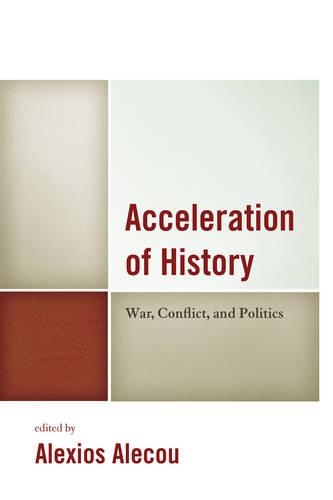
Acceleration of History: War, Conflict, and Politics
(Hardback)
Publishing Details
Acceleration of History: War, Conflict, and Politics
By (Author) Alexios Alecou
Contributions by Alexios Alecou
Contributions by Maria Mut Bosque
Contributions by Juan Luis Fernndez
Contributions by Andreas Karyos
Contributions by Nikolai S. Rozov
Contributions by Svetlana N. Shchegolikhina
Contributions by Marios Siammas
Contributions by Zenonas Tziarras
Bloomsbury Publishing PLC
Lexington Books
30th September 2016
United States
Classifications
Professional and Scholarly
Non Fiction
Social and cultural history
Political science and theory
Peace studies and conflict resolution
909.82
Physical Properties
Hardback
174
Width 156mm, Height 239mm, Spine 18mm
435g
Description
We willingly imagine that the speed of development of events has always remained constant here on earth. This is reflected in the fact that it is generally believed that the rate of natural phenomena is the same today as it has always been in the past and will remain this way more or less in the future. It is, now, a fact that the speed of progression of events is not constant over time. It was ascertained that since around the beginning of the 20th century the rate has accelerated in various fields, hence the term "acceleration of history" came to describe this phenomenon. This acceleration continues its course today and will even intensify. Examples meeting these historical vaults in short time periods are many, either local or international, that contributed to the change of the direction of history. Under any circumstances though, the mature conditions for change are not enough without the human interference. This phenomenon has been referred to as the acceleration of history in order to emphasize the fact that if in the past a certain lapse of time was necessary for history to unfoldfor the events to take placetoday, and starting around the beginning of the 20th century, this time lapse was becoming increasingly shorter. The events today, therefore, have intensified much more than in the past. So, which are considered as the main acceleration periods in history Which events or developments de-normalized or deeply reformed the then acceptable norms, either national or international Which events or developments changed the hard bits of history These are the questions that we will try to answer in this edited volume.
Reviews
From the Great Moderation to Peace in our Time, there have been instances of history where premature declarations of stability were shattered by a cavalcade of events. Thus the acceleration of history is a topical and important contribution to alternative narratives of history, as opposed to a structured and often spurious linearity. Alexios Alecou has brought together a notable set of scholars to look into the issue of the acceleration of history through a multitude of important historical themes. Drs. Rozov and Tziarras create a framework on how to interpret historical narratives in the theme of acceleration. Often, the acceleration of history is stimulated by conflict and war, and Dr. Shchegolikhina examines how war can create the conditions for historical acceleration. The framework and concepts presented in this collection provide powerful tools for reinterpreting some of the events discussed. In examining the Great War, the Second World War, decolonization in Cyprus, and the current European Union Crisis, the Drs. Fernndez, Siammas, Karyos, and Bosque emphasize how relationships can lead to a non-linear rapid transformation of history. This book is an important tool for the creation and understanding of non-linear narratives. -- Alexandros Apostolides, European University Cyprus
Author Bio
Alexios Alecou teaches history at the Open University of Cyprus.
